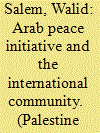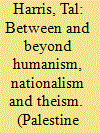| Srl | Item |
| 1 |
ID:
138329


|
|
|
|
|
| Summary/Abstract |
With the ongoing stalemate on the Israeli-Palestinian bilateral track, all who actively seek peace still see the Arab Peace Initiative (API) of 2002 as a potential point of departure for breaking the impasse, contingent on the Israeli government’s readiness to accept the API as a basis for discussion. The draft United Nations Security Council resolution circulated by France refers to the API; there are reports that the United States may be developing a new API-based plan for peace; and the European Union has shown interest on many occasions in moving in that direction. Many Israeli parties have developed API-based plans for peace such as MK Yaakov Peri (Yesh Atid), the Zionist Camp, Meretz and others. Even Foreign Minister Avigdor Lieberman wants to distort the API’s content by calling for normalizing relations with the Arab countries without withdrawing from the Palestinian and Arab territories occupied in 1967.
|
|
|
|
|
|
|
|
|
|
|
|
|
|
|
|
| 2 |
ID:
141349


|
|
|
|
|
| Summary/Abstract |
The Jewish national movement convened under the Zionist Congress, and the Palestinian national movement did so under the umbrella of the Palestinian Liberation Organization (PLO). The two movements were largely secular and inspired by the national discourse that swept across Europe in the 19th century and into the Middle East following World War I. In their international advocacy, the leaderships of the two rival movements have consistently and repeatedly cited articles from international law, which recognizes the legitimacy of the right to self-determination of both peoples west of the Jordan (from the recommendations of the Peel Commission through United Nations General Assembly Resolution 181 to United Nations Security Council Resolution 242), often cherry-picking those articles that would support their unilateral actions. To mobilize their grassroots base, historical circumstances of persecution and plight were emphasized, and though they were objectively entirely different, they granted both movements a similar sense of urgency.
|
|
|
|
|
|
|
|
|
|
|
|
|
|
|
|
| 3 |
ID:
188627


|
|
|
|
|
| Summary/Abstract |
Scholars have long debated when the Palestinian Liberation Organisation [PLO] first accepted the international consensus on a two-state settlement as a resolution to the Israel-Palestine conflict. This analysis contributes to the debate by closely examining PLO diplomatic support for a draft United Nations [UN] Security Council resolution along the lines of the two-state consensus in January 1976, its passage prevented by an American veto. Drawing upon declassified documents in American, UN, and British archives, this analysis argues that the record of negotiations at the Security Council strongly indicates that by the mid-1970s, the PLO was ready to accept the terms of a two-state settlement, even as the United States and Israel persistently rejected a negotiated settlement inclusive of Palestinian self-determination.
|
|
|
|
|
|
|
|
|
|
|
|
|
|
|
|